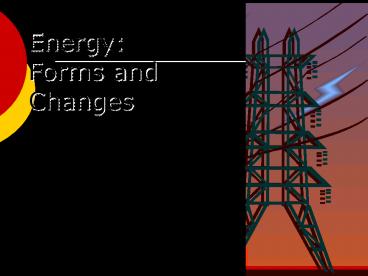Energy: PowerPoint PPT Presentation
1 / 30
Title: Energy:
1
Energy Forms and Changes
2
Nature of Energy
- Energy is all around you!
- You can hear energy as sound.
- You can see energy as light.
- And you can feel it as wind.
3
Nature of Energy
- You use energy when you
- hit a softball.
- lift your book bag.
- compress a spring.
4
Nature of Energy
- Living organisms need energy for growth and
movement.
5
Nature of Energy
- Energy is involved when
- a bird flies.
- a bomb explodes.
- rain falls from the sky.
- electricity flows in a wire.
6
Nature of Energy
- What is energy that it can be involved in so many
different activities? - Energy can be defined as the ability to do work.
- If an object or organism does work (exerts a
force over a distance to move an object) the
object or organism uses energy.
7
Nature of Energy
- Because of the direct connection between energy
and work, energy is measured in the same unit as
work joules (J). - In addition to using energy to do work, objects
gain energy because work is being done on them.
8
Forms of Energy
- The five main forms of energy are
- Heat
- Chemical
- Electromagnetic
- Nuclear
- Mechanical
9
Heat Energy
- The internal motion of the atoms is called heat
energy, because moving particles produce heat. - Heat energy can be produced by friction.
- Heat energy causes changes in temperature and
phase of any form of matter.
10
Chemical Energy
- Fuel and food are forms of stored chemical energy.
11
Electromagnetic Energy
- Power lines carry electromagnetic energy into
your home in the form of electricity.
12
Electromagnetic Energy
- Light is a form of electromagnetic energy.
13
Nuclear Energy
- The nucleus of an atom is the source of nuclear
energy.
14
Nuclear Energy
- Nuclear energy is the most concentrated form of
energy.
15
Mechanical Energy
- When work is done to an object, it acquires
energy. The energy it acquires is known as
mechanical energy.
16
Mechanical Energy
- When you kick a football, you give mechancal
energy to the football to make it move.
17
Mechanical Energy
When you throw a balling ball, you give it
energy. When that bowling ball hits the pins,
some of the energy is transferred to the pins
(transfer of momentum).
18
Energy Conversion
- Energy can be changed from one form to another.
Changes in the form of energy are called energy
conversions.
19
Energy Conversions
- In an automobile engine, fuel is burned to
convert chemical energy into heat energy. The
heat energy is then changed into mechanical
energy.
20
States of Energy Kinetic and Potential Energy
- Kinetic Energy is the energy of motion.
- Potential Energy is stored energy.
21
Kinetic Energy
- The energy of motion is called kinetic energy.
- The faster an object moves, the more kinetic
energy it has.
22
Potential Energy
- Potential Energy is stored energy.
- Stored chemically in fuel, the nucleus of atom,
and in foods. - Or stored because of the work done on it
- Stretching a rubber band.
- Winding a watch.
- Pulling back on a bows arrow.
- Lifting a brick high in the air.
23
Gravitational Potential Energy
- Potential energy that is dependent on height is
called gravitational potential energy.
24
Potential Energy
- Energy that is stored due to being stretched or
compressed is called elastic potential energy.
25
Gravitational Potential Energy
- A waterfall, a suspension bridge, and a falling
snowflake all have gravitational potential energy.
26
Kinetic-Potential Energy Conversion
Roller coasters work because of the energy that
is built into the system. Initially, the cars are
pulled mechanically up the tallest hill, giving
them a great deal of potential energy. From that
point, the conversion between potential and
kinetic energy powers the cars throughout the
entire ride.
27
Kinetic-Potential Energy Conversions
- As a basketball player throws the ball into the
air, various energy conversions take place.
28
Ball speeds up
Ball slows down
29
The Law of Conservation of Energy
- Energy can be neither created nor destroyed by
ordinary means. - It can only be converted from one form to another.
30
Vocabulary Words
- energy
- mechanical energy
- heat energy
- chemical energy
- electromagnetic energy
- nuclear energy
- kinetic energy
- potential energy
- gravitational potential energy
- energy conversion
- Law of Conservation of Energy

